Visiting a Village on the Zaire River
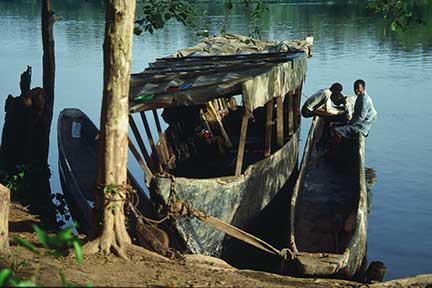 January 18 - 20, 1988
January 18 - 20, 1988
Note: The country Zaire no longer exists. It was founded by strongman Mobuto Sese Seko on October 27, 1971. He renamed both the nation and the river "Zaire", a word descended from an African word meaning "river that swallows all rivers." After Mobuto Sese Seko fled the country on May 17, 1997, the river's name reverted to Congo. The country is now called the Democratic Republic of the Congo.
We waited in Bumba, Zaire, for several days for the ferry to Kisangani. It would cut off miles of very bad road, and was supposed to be a highlight of the trip.
The ferry has no time schedule. It goes up and down the river, arriving when it arrives. Prospects didn't look good. So the trip leaders arranged an alternative—a two-day excursion out on the river in the only boat in town available for hire. We would camp on an island and return by a different route. For $6.00 each, it sounded great.
We were to leave at 3:00 p.m. We arrived in good time but the owners of the boat had to take the money we paid them to get gas, which took an hour and a half. As we waited, we looked doubtfully at the boat. Dennis and I had passed it on one of our walks and taken it for a wreck, no longer in use. It was a rickety contraption of weathered and partially rotten wood with two pirogues (long dugout canoes) roped to the sides. Perhaps the pirogues provided flotation.
Finally, at 4:30, we loaded our gear and ourselves onto the boat and pushed off. The current caught us as the boat owner pulled and pulled on the starter cord of one of the motors. After a long time, the small motor sputtered and started, running on one cylinder. We ferried across the river, with two of the guides working on the big motor. They finally got it to run.
In the meantime, Dennis and I and a few other people in one of the pirogues bailed frantically. Water rushed in through a large hole in the back and we could barely keep up with it. At last, when one of the guides had some spare time, he stuffed a rag in the hole. It worked amazingly well.
We had no idea how far we were going. The sun set, draping the clouds, river and jungle with pink and gold. Someone asked the driver how long it would be until we arrived.
"40 minutes," he replied.
We settled back to enjoy the sights, smells and sounds of the darkening jungle slipping by. About an hour later, after the sky turned inky black, someone else asked how long it would be until we arrived.
"About an hour," was the answer.
I began to feel concern.
The motor quit. After a few unintelligible curses, the men set to work with flashlights. Fortunately, the small motor was still chugging along on one cylinder, so we continued to make a little progress against the current.
They finally gave up trying to fix anything in the dark, and we limped along. It was pitch black except for the starlight, the glow of burning cigarettes, and the occasional light they flashed on the banks of the river. They were looking for something. A beach? A campsite? I wondered, despairing at the black thickness of jungle growth the lights revealed.
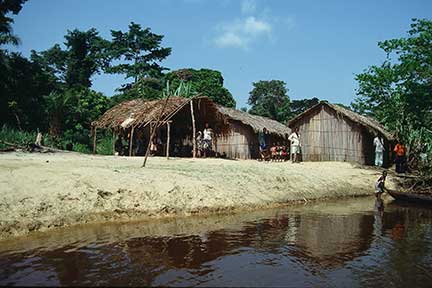 They were searching for a channel, and when they found it, one man smiled and said, "Soon." We rounded a corner and saw fires burning on shore. People shouted to the boat and the men shouted back. A crowd gathered with kerosene lamps as we pulled up to the village and our drivers greeted everyone and explained our presence. We were directed to pitch our tents or mosquito nets in or near the main clearing. One person made a mistake and pitched his mosquito net under an elevated platform where a baby slept. No diapers here. He had to move.
They were searching for a channel, and when they found it, one man smiled and said, "Soon." We rounded a corner and saw fires burning on shore. People shouted to the boat and the men shouted back. A crowd gathered with kerosene lamps as we pulled up to the village and our drivers greeted everyone and explained our presence. We were directed to pitch our tents or mosquito nets in or near the main clearing. One person made a mistake and pitched his mosquito net under an elevated platform where a baby slept. No diapers here. He had to move.
As usual, all the locals gathered around to watch and comment to each other on everything we did. It wasn't every day a traveling circus arrived!
After our tent was up and we had eaten, we wandered down the shore and joined some people around a fire. I was determined to practice my French. They understood me, but their dialect was so strong that I could barely understand them. I was discouraged. We were served palm wine, and shown with pride some monkeys they had bagged that afternoon in the jungle.
"Did you know we were coming?" I asked in French.
"No."
"Do many tourists come here?"
"No, none."
Considering that no one asked for handouts, it was likely true.
When we went to bed, we used the flashlight to check for mosquitoes. There weren't many around but they were hungry, and were the only ones in Africa that tried to bite through our clothes.
It was a peaceful night, except for once in the early morning when a rat ran over the top of the tent, waking Dennis.
The natives were up at first light. We woke to find a single mosquito in the tent, full of blood. There was a small hole in the mosquito net. Curses! We patched it with a Band-aid and hoped that particular mosquito didn't carry malaria. (Unfortunately, it did.)
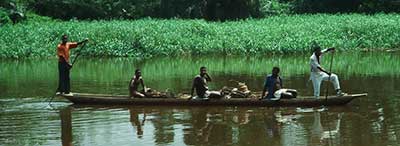 After breakfast, I wandered up and down the shore. The boat men were noisily trying to fix the motor.
After breakfast, I wandered up and down the shore. The boat men were noisily trying to fix the motor.
To my delight, one young man I'd talked with the night before came up in his pirogue and offered to take Dennis and me and a few others for a ride. I helped row, standing up as they did with a long paddle. Being on the water gave me a terrific sense of freedom. We floated downstream, around a bend and into another channel to a neighboring village. All the people came down to greet us and lined up to shake our hands one by one. We admired their babies, to their great delight. A very young boy was carefully baiting his fishing pole with little squiggly worms. He pulled out a tiny fish with each cast and dropped it into a bottle, for soup I supposed. He took his job very seriously.
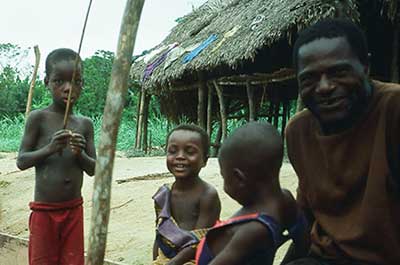 One guy in our group tried fishing, but couldn't catch a thing. For a moment, the solemn little boy almost smiled.
One guy in our group tried fishing, but couldn't catch a thing. For a moment, the solemn little boy almost smiled.
The adults smiled a lot. They brought down some big fish, freshly caught, to trade or sell. When they learned we had no money with us, they gave us a fish, and let everyone sample their smoked fish. They were proud and friendly, real people.
We left and ferried across the channel to a camp where palm wine was made. The young man took us back into the jungle on a trail. We met a woman coming the opposite way with a stick trap full of muddy fish. The fish, they explained, live in mud rather than in water.
We continued upstream on the pirogue after a while, under overhanging branches along the edge of the river. Many other pirogues passed us, some small ones rowed by children no more than 3-4 years of age. Beautiful water hyacinths, with delicate pale purple flowers, floated by. These invasive plants were introduced in the 1950s, and are a major hazard for motorboats.
We left the village after lunch. Because of the motor problems, we would shorten our trip and go back the way we came. Within an hour, the motor quit again. We swam in the river to cool off while it was being "fixed." It ran intermittently all afternoon. The human-powered pirogues on the river made better time.
We stopped at an open area before dark. It had some shade huts without walls. No people. We learned later it was a market.
Before dawn, a pirogue passed, the rowers singing a haunting African melody with multiple harmonies. The first vendors arrived at daybreak and began setting up shop. They were puzzled by our presence, but satisfied with our guides' explanation. They went about their business, setting out baskets and boxes of smoked fish, eels, rice, monkeys, grubs, bread, salt, seasonings, and cassava as well as soap, flashlights, glass bottles of petrol and dozens of other things I didn't recognize.
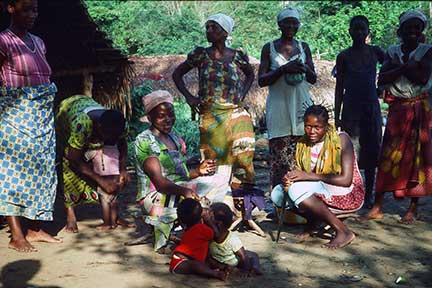
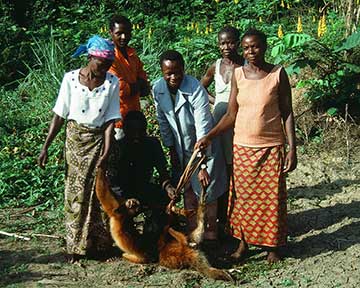
They had not seen many tourists, either, and had no prejudices. They chattered and laughed incessantly, and seemed very happy to see each other. They welcomed us to take pictures, even posed and competed to be in our photos while laughing and joking with each other.
We set off after a few hours, waving goodbye. The previously unreliable motor was working great, but the old faithful's last cylinder quit. As we crossed the strong current towards Bumba, a shear pin broke on the working motor. More curses. The owner pulled a nail from the boat and tried to fix it. It smoked badly, but it worked, against the current, for about 100 yards. We drifted back to a sand bar to try again. In despair, they finally untied one of the pirogues and two of them rowed it upstream to Bumba to get another motor. An hour later, they were back. The new motor didn't work either.
I began to wonder if or when search parties would arrive.
The African ability to jerry-rig cannot be underestimated. They disassembled all three motors and reassembled the parts into one that worked. It didn't work well, but it got us back to Bumba by nightfall.
That was no small accomplishment!
Go on to Pygmies
Source: www.SusanCAnthony.com, ©Susan C. Anthony
